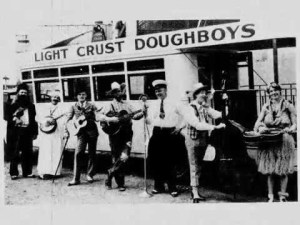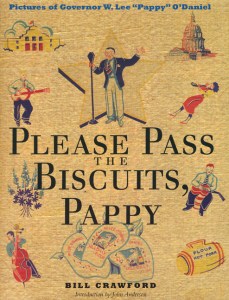 In the movie O Brother, Where Art Thou?, the Coen Brothers retold – sort of – Homer’s Odyssey, but relocated to depression-era Mississippi. (It also generated interest in so-called “Americana” or “Roots” music,” thanks to the best-selling soundtrack put together by T-Bone Burnett.) George Clooney played Ulysses Everett McGill, a chain-gang escapee and con man, trying to get back to his estranged wife Penny, portrayed by Holly Hunter, and their seven daughters. He needs to prove he’s “bona fide,” so they will take him back.
In the movie O Brother, Where Art Thou?, the Coen Brothers retold – sort of – Homer’s Odyssey, but relocated to depression-era Mississippi. (It also generated interest in so-called “Americana” or “Roots” music,” thanks to the best-selling soundtrack put together by T-Bone Burnett.) George Clooney played Ulysses Everett McGill, a chain-gang escapee and con man, trying to get back to his estranged wife Penny, portrayed by Holly Hunter, and their seven daughters. He needs to prove he’s “bona fide,” so they will take him back.
You’re probably asking what this has to do with Donald Trump.
In the movie, Charles Durning’s character, Pappy O’Daniel,  is a politician who attracts crowds to his campaign rallies by providing musical entertainment. The real-life Pappy was a Texan, a businessman and entertainer turned politician. Wilbert Lee O’Daniel came to Fort Worth from Kansas and became manager, then president of the Burris Mill and Elevator Company, makers of Light Crust Flour. In 1931 Burris began sponsorship, and O’Daniel the host, of a radio show. The program featured the music of Bob Wills and the Light Crust Doughboys. Wills and the radio show gained popularity. After a falling out with O’Daniel, Wills went on to fame as the progenitor of western swing with his Texas Playboys. Although not a musician, O’Daniel declared himself bandleader and continued as host of the program. He left Burris in 1935, started his own flour business. He used his increasingly popular radio show to promote his Pappy O’Daniel’s Sunshine Wheat Flour.
is a politician who attracts crowds to his campaign rallies by providing musical entertainment. The real-life Pappy was a Texan, a businessman and entertainer turned politician. Wilbert Lee O’Daniel came to Fort Worth from Kansas and became manager, then president of the Burris Mill and Elevator Company, makers of Light Crust Flour. In 1931 Burris began sponsorship, and O’Daniel the host, of a radio show. The program featured the music of Bob Wills and the Light Crust Doughboys. Wills and the radio show gained popularity. After a falling out with O’Daniel, Wills went on to fame as the progenitor of western swing with his Texas Playboys. Although not a musician, O’Daniel declared himself bandleader and continued as host of the program. He left Burris in 1935, started his own flour business. He used his increasingly popular radio show to promote his Pappy O’Daniel’s Sunshine Wheat Flour.
 Pappy entered politics in 1938. Although he had never voted – he didn’t think it was worth it to pay the poll tax – he and his band criss-crossed Texas in their tour bus, campaigning for governor and promoting Pappy’s flour. His platform was the Ten Commandments and a $30-per-month pension for all citizens over age 65, based on the commandment to “Honor thy father and mother.”
Pappy entered politics in 1938. Although he had never voted – he didn’t think it was worth it to pay the poll tax – he and his band criss-crossed Texas in their tour bus, campaigning for governor and promoting Pappy’s flour. His platform was the Ten Commandments and a $30-per-month pension for all citizens over age 65, based on the commandment to “Honor thy father and mother.”
He won. Instead of an inaugural ball, he entertained 60,000 attendees in a football stadium. After his re-election, 20,000 people came to his free inauguration barbecue.
He was less successful at actual governing, however. His “Thirty Bucks for Mamma: went nowhere. He saw conspiracies everywhere. He ordered the highway patrol and the Texas Rangers “to make sure that all un-American activities within the borders of our state be properly investigated and handled.” Because “no recent governor has been so unfairly dealt with as the press has dealt with me,” he started his own newspaper, The W. Lee O‘Daniel News. When two members of his band quit, Pappy told his listeners – yes, he still had his radio show – that “the gang of professional politicians” had “struck another blow at your governor.”
So of course, he ran for the U.S. Senate. He waged a fierce campaign against the well-connected Lyndon Johnson. As governor, O’Daniel had made some effort to regulate the alcohol industry. The liquor lobby supported his efforts, as they felt the industry in Texas would do better with Pappy in Washington. Much of the voting populace agreed; voting him into the Senate would limit the damage he could inflict on the state. Although LBJ was proficient at ballot stuffing, Pappy’s supporters were better at it. O’Daniel served two terms in the Senate.
And Donald Trump?